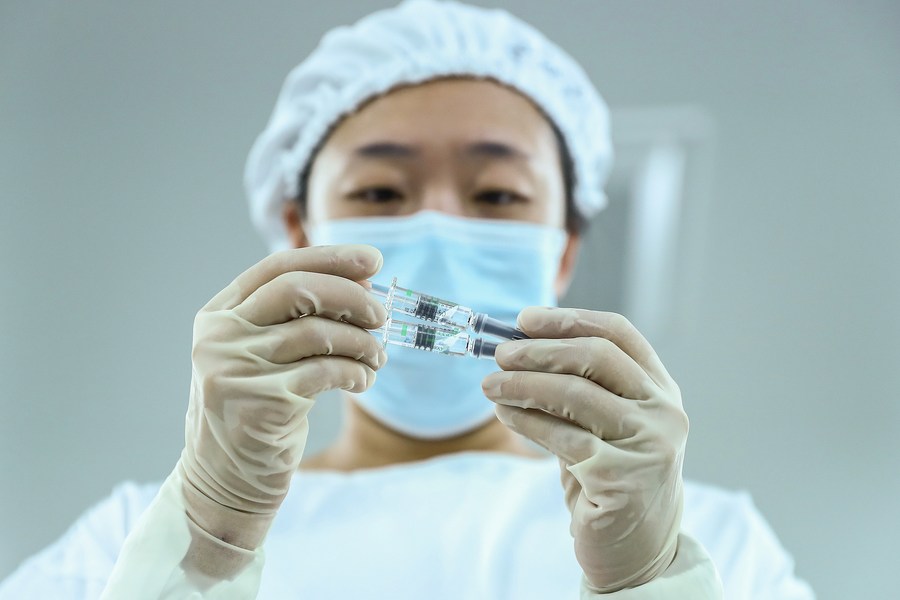 A staff member checks the packaging quality of COVID-19 inactivated vaccine products at a packaging plant of the Beijing Biological Products Institute Co., Ltd. in Beijing, capital of China, Dec. 25, 2020. (Xinhua/Zhang Yuwei)
A staff member checks the packaging quality of COVID-19 inactivated vaccine products at a packaging plant of the Beijing Biological Products Institute Co., Ltd. in Beijing, capital of China, Dec. 25, 2020. (Xinhua/Zhang Yuwei)
BEIJING, Dec. 31 (Xinhua) -- Despite the good news that the COVID-19 vaccine has been effective in trials, the life-saving product has, time and again, been politicized by certain Western politicians, who portray China's vaccines as a bargaining chip to expand political influence.
"Vaccine diplomacy" is the term certain Western critics often like to use. They claim that the vaccine has become a tool to increase China's global influence and iron out geopolitical issues.
The latest accusation of China's "vaccine diplomacy" comes after allegations like "COVID-19 originated in a lab in Wuhan" and "mask diplomacy," which have the same intention. Going by their nature, they are in line with their bias against China.
These voices, however, do not represent the mainstream view.
China has made the solemn and consistent commitment that once developed and deployed, its vaccines will be made global public goods and supplied to the world at fair, reasonable prices.
Xulio Rios, director of the Observatory of Chinese Politics in Spain, said China has been accused of using the COVID-19 vaccine as a strategic tool to silence criticism, but this is not the case. Certain western countries want to win the vaccine race at all costs, and that's why they denigrate China for no reason.
The fact is that China, one of the first few countries that started to develop a COVID-19 vaccine, did not develop the jab with the purpose of spreading political influence in other countries.
What China has done is actually promote international cooperation in vaccines. As early as May, China had promised that COVID-19 vaccine development and rollout in the country will be made a global public good, which will be China's contribution to ensuring vaccine accessibility and affordability in developing countries.
Since the COVID-19 outbreak, China has adopted five technological approaches to developing the vaccines. By Dec. 2, the country had five COVID-19 vaccines entering phase-3 clinical trials.
China has approved the domestic emergency use of vaccines, and there hasn't been any severe adverse reaction so far. Recently, the United Arab Emirates and Bahrain approved the registration of a COVID-19 vaccine developed by Sinopharm and proposed to purchase Chinese vaccines. Studies showed that China-made vaccines can be more easily stored and delivered via the current cold-chain system, indicating greater accessibility without extra delivery cost.
All this proves the safety and effectiveness of Chinese vaccines as well as the regulatory authority's observance of international customary practice and laws.
Making real progress in the cause of human rights lies in concrete actions, not political showmanship. That is why China has all along maintained close communication and cooperation with the World Health Organization (WHO) and Gavi, the Vaccine Alliance.
While most countries worldwide are pooling efforts to develop and distribute vaccines, the world must guard against the emergence of vaccine nationalism.
The world can stabilize health systems and rebuild the global economy only when those at highest risk from the virus everywhere and at the same time are protected, WHO Director-General Tedros Adhanom Ghebreyesus once said.
"Like an orchestra, we need all instruments to be played in harmony to create music that everyone enjoys," he said. ■



